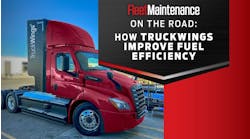Fuel represents approximately 60% of a fleet’s operating costs and is the second largest total cost of ownership expense after depreciation. Identifying ways to secure fuel economy gains is therefore a key consideration for fleets of all sizes.
When considering the overall fuel economy of a vehicle, engine oils and other lubricants are often overlooked, but they can play a key role in contributing to the fuel efficiency of a vehicle.
Engine oils and lubricants protect vital hardware and support the vehicle’s overall performance. Engine oils can improve engine performance and efficiency, which can contribute to reduced fuel consumption.
Selecting the right engine oil for your operation
The use of lower viscosity lubricants, which require less work to move through the engine and can flow faster, can offer fleets fuel economy benefits. They also enhance engine performance and efficiency by reducing engine drag, as well as pumping and rotational losses.
In colder climates, low viscosity lubricants also reduce the warm-up time of the engine and ensure protection for fleets operating in these harsh conditions.
Low viscosity lubricants are subject to the same robust qualification testing process as traditional higher viscosity lubricants to determine their performance characteristics, including wear protection, durability, oxidation resistance, aeration control, and shear stability.
However, when selecting a lubricant to improve fuel economy, there are several key factors to consider:
- Seek Original Equipment Manufacturer (OEM) advice: The first step should always be to consult the OEM manual for advice on oil selection. If further advice is needed, the OEM can be contacted directly for information and guidance based on the engine’s specifications.
- Consider the operating conditions: The environment and operating conditions of the engine should be the next consideration when selecting a heavy-duty engine oil.
- The temperature range in which lubricants can perform optimally is denoted by its SAE grade, which is a measure of the oil’s viscosity. The viscosity of the oil dictates its ability to flow and move around the engine to lubricate its inner workings.
- In cold conditions, if the oil’s viscosity is too high, it may resist movement and delay the lubrication of vital engine components, which can result in increased engine wear. In these conditions, lower viscosity engine oils, such as SAE 5W-30, are more suitable as they allow the oil to flow better at lower ambient temperatures.
- For fleets operating in warmer regions, a multi-grade heavy engine lubricant with a viscosity of SAE 10W-30 may be more suitable. These oil grades resist the breakdown associated with higher temperatures to allow adequate flow and lubrication of critical engine components.
- Compare synthetic vs. non-synthetic engine oils: It is also important to consider the benefits of synthetic versus non-synthetic oils. Synthetic lubricants can offer enhanced performance characteristics compared to conventional oils, due to their superior low temperature performance and ability to maintain viscosity to protect the engine at increased operating temperatures. Fully synthetic oils are designed for premium performance and only use synthetic base stocks combined with high-performance additives to further improve the oil’s performance.
- Request proof of performance: For fleets looking to secure fuel economy gains, proof of performance is key when selecting a lubricant. This should include proof of certification to relevant industry standards such as ACEA or API, along with results of real-world trials and testing. Customer testimonials and case studies are valuable examples of real-world use, as is testing carried out by the lubricant manufacturer.
- Seek expert lubricant manufacturer support: The final step to making a fully informed lubricant choice is to seek expert support and guidance from a reputable lubricant manufacturer. Expert lubricant manufacturers have dedicated technical teams who can support throughout the lubricant selection process and provide informed recommendations based on extensive experience and product testing data.
A holistic approach to fuel economy gains
Low viscosity lubricants can also support in the holistic approach for fuel efficiency improvements and be used, where permissible, throughout the vehicle. For example, controlled field testing has shown that synthetic SAE 75W-90 gear oils can offer up to 2.25% fuel economy improvement, compared to their SAE 85W-140 counterparts.
This performance data shows how lubricants can contribute to improved fuel economy and efficiency. However, as mentioned, it is vital to always check the OEM manual and work with lubricant experts to select the correct lubricant for your fleet and operating needs.
A holistic approach to securing fuel economy gains including the use of low viscosity lubricants can enable all driveline components, including heavy-duty engines, to run more efficiently. By switching to lower viscosity oils, fleets can enhance their vehicle’s performance and be reassured that they’re considering all avenues that contribute to enhanced fuel economy, which can have a significant impact on a business’s bottom line.




